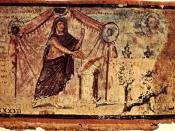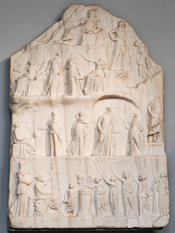According to Homer, fate is the supreme ruler in the lives of humanity. No matter how talented or determined you may be, in the end it is fate, which directs the happenings in a person's life. Throughout his books the Iliad and the Odyssey, Homer emphasizes the effect of fate on the lives of mankind.
Homer especially illustrates this view of fate's control in the character of Hektor in the Iliad. Hektor was a religious man, faithful to the gods, and when it appeared that the Trojans were losing, he tried to make sacrifices to Athena. Unfortunately it was to no avail, Athena refused to accept his sacrifices, and the Trojans would eventually lose. Homer showed through this, that even through devotion to the gods, it was impossible to change a man's fate, in Hektor's case, defeat and death on the battlefield.
] When the final battle against the Achaians began to turn against the Trojans, and all the other Trojans retreated within the walls of the city, only Hektor remained to fight Achilles. Despite his devotion to the gods, none could support him, because they realized that it was his fate to die in this battle. Homer again had showed how even faithfulness to the gods could not change a man's fate.
As Achilles neared, Hektor saw that he was no match for Achilles and at first he ran. Hektor's skills as a warrior were no longer enough, because his fate had led him to a warrior greater than he. Achilles, not only had the support of Apollo, but also was impervious to injury everywhere except his heel. Most of all though, Achilles had a singular focus on the goal he meant to accomplish, revenge on Hektor. Finally, Hektor turned and faced Achilles, knowing there was...


